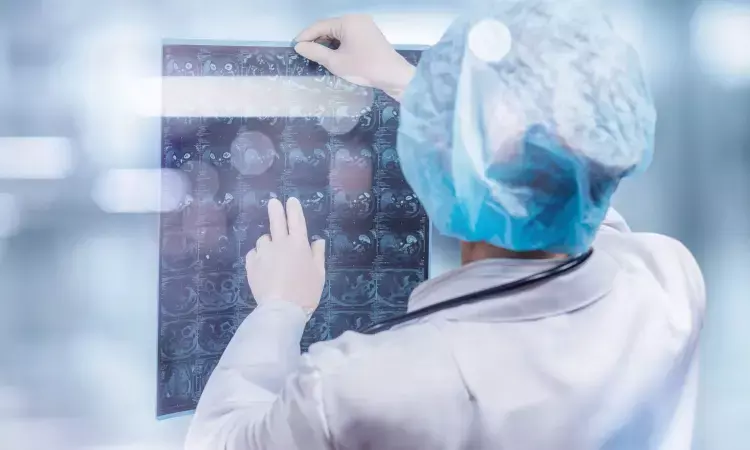- Home
- Medical news & Guidelines
- Anesthesiology
- Cardiology and CTVS
- Critical Care
- Dentistry
- Dermatology
- Diabetes and Endocrinology
- ENT
- Gastroenterology
- Medicine
- Nephrology
- Neurology
- Obstretics-Gynaecology
- Oncology
- Ophthalmology
- Orthopaedics
- Pediatrics-Neonatology
- Psychiatry
- Pulmonology
- Radiology
- Surgery
- Urology
- Laboratory Medicine
- Diet
- Nursing
- Paramedical
- Physiotherapy
- Health news
- Fact Check
- Bone Health Fact Check
- Brain Health Fact Check
- Cancer Related Fact Check
- Child Care Fact Check
- Dental and oral health fact check
- Diabetes and metabolic health fact check
- Diet and Nutrition Fact Check
- Eye and ENT Care Fact Check
- Fitness fact check
- Gut health fact check
- Heart health fact check
- Kidney health fact check
- Medical education fact check
- Men's health fact check
- Respiratory fact check
- Skin and hair care fact check
- Vaccine and Immunization fact check
- Women's health fact check
- AYUSH
- State News
- Andaman and Nicobar Islands
- Andhra Pradesh
- Arunachal Pradesh
- Assam
- Bihar
- Chandigarh
- Chattisgarh
- Dadra and Nagar Haveli
- Daman and Diu
- Delhi
- Goa
- Gujarat
- Haryana
- Himachal Pradesh
- Jammu & Kashmir
- Jharkhand
- Karnataka
- Kerala
- Ladakh
- Lakshadweep
- Madhya Pradesh
- Maharashtra
- Manipur
- Meghalaya
- Mizoram
- Nagaland
- Odisha
- Puducherry
- Punjab
- Rajasthan
- Sikkim
- Tamil Nadu
- Telangana
- Tripura
- Uttar Pradesh
- Uttrakhand
- West Bengal
- Medical Education
- Industry
Both AI and radiologists can get fooled by tampered medical images, study finds

USA: A recent study published in Nature Communications suggests the need for continuing research on safety issues related to the artificial intelligence (AI) model and highlights the need for safety measures in AI. The study found that the AI model was fooled by over two-thirds of fake breast images which makes them prone to cyberattacks.
In recent years while active efforts are being made in advancing AI model development and clinical translation. New safety issues of the AI models are emerging but not much research has been done in this direction.
Shandong Wu, Department of Radiology, University of Pittsburgh, Pittsburgh, PA, USA, and colleagues performed a study investigate the behaviors of an AI diagnosis model under adversarial images generated by Generative Adversarial Network (GAN) models and to evaluate the effects on human experts when visually identifying potential adversarial images.
The GAN model makes intentional modifications to the diagnosis-sensitive contents of mammogram images in deep learning-based computer-aided diagnosis (CAD) of breast cancer.
In the authors' experiments, the adversarial samples fool the AI-CAD model to output a wrong diagnosis on 69.1% of the cases that are initially correctly classified by the AI-CAD model. Five breast imaging radiologists visually identify 29%-71% of the adversarial samples.
"Our experiments showed that highly plausible adversarial samples can be generated on mammogram images by advanced GAN algorithms, and they can induce a deep learning AI model to output a wrong diagnosis of breast cancer," wrote the authors.
"Certified human radiologists can identify such adversarial samples, but they may not be reliable to safely detect all potential adversarial samples, where an education process showed promise to improve their performance in recognizing the adversarial images," they explained. "This poses an imperative need for continuing research on the medical AI model's safety issues and for developing potential defensive solutions against adversarial attacks"
Reference:
Zhou, Q., Zuley, M., Guo, Y. et al. A machine and human reader study on AI diagnosis model safety under attacks of adversarial images. Nat Commun 12, 7281 (2021). https://doi.org/10.1038/s41467-021-27577-x
Dr Kamal Kant Kohli-MBBS, DTCD- a chest specialist with more than 30 years of practice and a flair for writing clinical articles, Dr Kamal Kant Kohli joined Medical Dialogues as a Chief Editor of Medical News. Besides writing articles, as an editor, he proofreads and verifies all the medical content published on Medical Dialogues including those coming from journals, studies,medical conferences,guidelines etc. Email: drkohli@medicaldialogues.in. Contact no. 011-43720751


